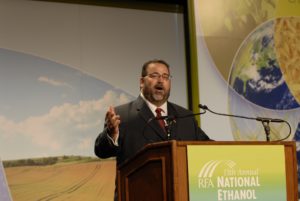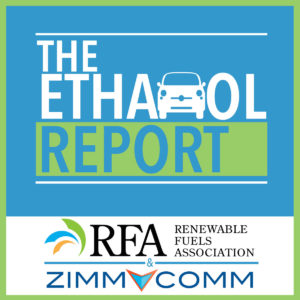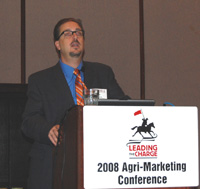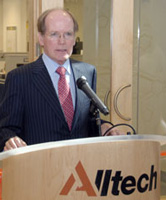Higher Oil Prices Highlight Renewable Fuels for Energy Security
As 2008 dawned, the world saw crude oil prices break the $100 a barrel barrier for the first time as continuing volatility of world oil and energy markets highlighted the importance of the energy legislation Congress passed at the end of 2007.
Robert White, who was serving as interim head of the Ethanol Promotion and Information Council at the time, said higher oil prices translate into economic hardship for consumers and higher profits for oil companies. “The American public is looking for realistic solutions to our dependence on a dwindling supply of energy of which ethanol plays an important role. Once again, the ethanol industry will rise to the challenge and continue to provide a renewable, efficient, economy boosting product for Americans. Without ethanol, the cost of our oil addiction is far too great.”
 In his final State of the Union address to the nation, President George W. Bush once again acknowledged the importance of domestic fuels for energy security and the environment.
In his final State of the Union address to the nation, President George W. Bush once again acknowledged the importance of domestic fuels for energy security and the environment.
To build a future of energy security, we must trust in the creative genius of American researchers and entrepreneurs and empower them to pioneer a new generation of clean energy technology. Our security, our prosperity, and our environment all require reducing our dependence on oil.
Last year, I asked you to pass legislation to reduce oil consumption over the next decade, and you responded. Together we should take the next steps: Let us fund new technologies that can generate coal power while capturing carbon emissions. Let us increase the use of renewable power and emissions-free nuclear power. Let us continue investing in advanced battery technology and renewable fuels to power the cars and trucks of the future. Let us create a new international clean technology fund, which will help developing nations like India and China make greater use of clean energy sources. And let us complete an international agreement that has the potential to slow, stop, and eventually reverse the growth of greenhouse gases.
State of the Ethanol Industry in 2008
 Thanks to President Bush’s focus on the nation’s security, prosperity, and environment, the ethanol industry was preparing for yet another year of record growth.
Thanks to President Bush’s focus on the nation’s security, prosperity, and environment, the ethanol industry was preparing for yet another year of record growth.
Renewable Fuels Association President and CEO Bob Dinneen addressed a record crowd more than 2,200 attendees at the 13th Annual National Ethanol Conference in Orlando, Florida.
“Today’s US ethanol industry is bringing about revolutionary change. It is reshaping our rural landscape, revitalizing communities and providing the most significant value added markets farmers have ever seen. Even more dramatic is the change that ethanol is bringing to US motor fuel markets. Ethanol is now a ubiquitous component of the US motor fuel supply, blended in more than 50% of the nation’s gasoline and will very soon be in virtually every single gallon of gasoline sold from coast to coast and border to border,” said Dinneen.
“With your continued commitment, I can report to you without exaggeration or hyperbole that the state of the U.S. ethanol industry is sound, that we are prepared to meet the opponents of change with facts, with a resolute spirit, and with renewed dedication to the proposition that together we can change our nation’s energy, economic and environmental destiny.”
 Ethanol Report Podcast Debuts
Ethanol Report Podcast Debuts
“Fill up, Feel Good” was the first podcast produced for the ethanol industry under the auspices of the Ethanol Promotion and Information Council (EPIC), but as that organization began to mutate, the Renewable Fuels Association started its own podcast called simply The Ethanol Report, which focused more on biofuels policy topics.
In the first “Ethanol Report,” RFA President and CEO Bob Dinneen gushed over the opportunities for ethanol in 2008, while cautiously noting the challenges ahead.
“I think we will continue to see dramatic growth in ethanol production here at home and abroad as well,” said Dinneen. “You’re going to see ethanol used in parts of the country where it really has not been used much before.”
The challenges are going to come in meeting the targets of the recently passed energy bill, especially in commercializing cellulosic ethanol.
“It’s not going to be easy, we’re going to be working awfully hard,” but he says it will ultimately result in tremendous benefits for rural economies and the nation’s consumers.
The presidential elections will be the main focus this year, but Dinneen says ethanol is a bipartisan issue that is supported by all the candidates who are learning more about it as they campaign around the Midwest. “There really is not a single candidate that has failed to express support for increasing the production and use of renewable fuels like ethanol,” Dinneen said. “They all get it.”
Oil Hits New Highs and Lows
In 2008, crude oil prices experienced significant volatility, largely due to the global financial crisis with prices peaking at a record high of $147.27 per barrel on July 11, 2008, driven by strong global demand, particularly from China and India, geopolitical tensions, and speculation in futures markets. By December 2008, prices had collapsed to a low of $30.28 per barrel as the financial crisis deepened, reducing demand and triggering a global recession.
 As prices rose at the pump throughout the year ethanol got support from an unlikely source – billionaire oilman T. Boone Pickens, who gave us the timeless quote that ethanol is “an ugly baby but it’s ours and it will move cars.”
As prices rose at the pump throughout the year ethanol got support from an unlikely source – billionaire oilman T. Boone Pickens, who gave us the timeless quote that ethanol is “an ugly baby but it’s ours and it will move cars.”
Boone told Oil and Gas Investor’s Forum in Houston that he preferred the “less-than-perfect fuel” over imported oil because there is “no question” that America must embrace alternate energy sources to alleviate the $700-billion transfer of wealth out of the country to oil imports.
Pickens says the United States is having an energy crisis and that should be the top campaign issue in the presidential election. “Energy is not a debate; it’s a crisis for this country,” Pickens said. “We cannot continue down the path were on. It’s that desperate.”
Cellulosic Race Continues
With the newly passed Renewable Fuel Standard calling for 21 billion gallons of renewable fuels created from biomass over the next ten years, the need to get cellulosic ethanol to market was pressing.
 In his new job as Vice President of Business Development for KL Process Design Group of South Dakota, Tom Slunecka gave a presentation at the 2008 Agri-Marketing Conference in Kansas City on the state of cellulosic ethanol.
In his new job as Vice President of Business Development for KL Process Design Group of South Dakota, Tom Slunecka gave a presentation at the 2008 Agri-Marketing Conference in Kansas City on the state of cellulosic ethanol.
KL Process Design Group was the first company to get a small-scale cellulosic ethanol plant on-line using waste-wood material to produce about 1.5 million gallons of ethanol a year. “Our process is a heat and mechanical pre-treatment process. There is a biochemical process, there is a syngas process, and then there are combinations of all the above,” Slunecka said. “There is no silver bullet. We’re gonna need them all to produce the amount of fuel that is needed.”
The company went public and changed its name to KL Energy Corp in 2008, but ultimately ceased operations in 2012 following financial difficulties, a bankruptcy filing, and legal disputes.
The Department of Energy continued to hand out cellulosic grants around the country, with even the Bluegrass State turning to switchgrass for running on the roads instead of running for the roses.
 Lexington-based Alltech, an animal health and distilling company, received a $30 million DOE grant to build a $70 million plant through a new subsidiary called Ecofin. “In 15-18 months, we will be using what we call solid state fermentation to go forward cracking cellulose to ethanol,” said Alltech president Dr. Pearse Lyons. “And we will use 30 percent corn stover or switchgrass.”
Lexington-based Alltech, an animal health and distilling company, received a $30 million DOE grant to build a $70 million plant through a new subsidiary called Ecofin. “In 15-18 months, we will be using what we call solid state fermentation to go forward cracking cellulose to ethanol,” said Alltech president Dr. Pearse Lyons. “And we will use 30 percent corn stover or switchgrass.”
Lyons was a strong supporter of biofuels. As a native of Ireland, he moved to the United States in 1976 to train ethanol distillers in Kentucky, but when President Jimmy Carter started talking about gasohol, Lyons also found himself talking with farmers about making fuel from corn.
He created Alltech in 1980 to apply his fermentation expertise to provide sustainable solutions for agriculture industry using proprietary yeast technology. He established The Alcohol School in Lexington, KY, in 1980 and also published and co-authored “The Alcohol Textbook,” a key source for the beverage, fuel, and industrial alcohol industries. His first textbook was titled “A step to energy independence” and focused on alternative fuels.
Lyons was enthusiastic about finding alternative cellulosic feedstocks for biofuels. “I would say converting cellulose to feed for our animals, converting cellulose to fuel for our cars is the next Manhattan Project,” he said in a 2007 interview.
Despite Alltech’s best intentions the Ecofin biorefinery was never built, and the project was effectively abandoned. Alltech shifted its focus to other ventures, such as acquiring an algae fermentation facility in Winchester, Kentucky, in 2010.
Cellulosic Milestones in 2008
 The 2008 farm bill, entitled the Food, Conservation, and Energy Act of 2008, was passed in May, with many of its provisions building on the goals of the Energy Independence and Security Act of 2007, particularly the emphasis on facilitating production of biofuels derived from cellulosic feedstocks.
The 2008 farm bill, entitled the Food, Conservation, and Energy Act of 2008, was passed in May, with many of its provisions building on the goals of the Energy Independence and Security Act of 2007, particularly the emphasis on facilitating production of biofuels derived from cellulosic feedstocks.
Senate Agriculture Committee chairman Tom Harkin (D-IA) said at the time that the bill “increases biofuels production by accelerating commercialization of advanced biofuels, like cellulosic ethanol, by helping farmers produce biomass crops, by providing grants and loan guarantees for new biorefineries, and by increasing bioenergy research.”
Senate Ag Ranking Republican Saxby Chambliss of Georgia said of the bill, “We’re going to make sure that we provide future generations with alternative energy projects and that we do it in the right way.”
The 2008 farm bill energy title provided $1 billion in financial incentives and support to encourage the production of mainly cellulosic biofuels, including a cellulosic biofuels production tax credit for up to $1.01 per gallon; funding for loan guarantees to commercial scale bio-refineries for advanced biofuels; a program to encourage farmers to establish and grow biomass crops in areas around biomass facilities; and continuation of research and development through the biomass energy research program administered jointly by the Departments of Agriculture and Energy. The bill more than doubled previous funding, providing $118 million for research.
 Verenium was another company out front in the cellulosic race in 2008, opening a 1.4 million gallon-per-year demonstration-scale cellulosic ethanol facility in Jennings, Louisiana.
Verenium was another company out front in the cellulosic race in 2008, opening a 1.4 million gallon-per-year demonstration-scale cellulosic ethanol facility in Jennings, Louisiana.
“This is a major step forward and a transformational moment for Verenium and the next-generation ethanol industry as we seek commercially-viable alternatives to traditional fuel sources,” said Carlos A. Riva, President and Chief Executive Officer of Verenium. “This is a first for the U.S. and as we take the next step toward commercialization, we are breaking new ground and setting new standards for our industry.”
Verenium received a $40 million DOE grant in July 2008, entered into a partnership with BP to use sugarcane as feedstock, and got a approval for a plant to be built in south Florida. The enthusiasm for cellulosic was high.
In Georgia, a company called Range Fuels had a cellulosic pilot project using woody biomass that attracted the attention of rock and roll keyboardist and tree farmer Chuck Leavell.“Cellulosic biofuels I think are extremely important,” Leavell said in a 2008 interveiw. “I tell people look, trees are organic, they are renewable, so this is a renewable resource. Unlike fossil fuels, which is not renewable and we’ll be using parts of these trees that are normally pushed aside and burned and not used….I’m pleased to see it coming on board. It’s going to take a little while longer I think to really get it down, but we are going to.”
Range Fuels broke ground on its Soperton, Georgia cellulosic ethanol facility in November 2007 with the backing of Vinod Khosla, a $76 million grant from the US Department of Energy, $6 million from the State of Georgia, and an $80 million loan guaranteed by the U.S. Biorefinery Assistance Program. The company hoped to produce 20 million gallons of cellulosic ethanol in 2008, but there were the inevitable delays.
“We expect to be producing ethanol next year,” said senior vice president of business development Bill Schafer in an August update. “Everything costs more and takes longer than you thought it would,” he said. “It’s nothing exceptional, it’s the things you would expect. But anything that constitutes a delay is a real disappointment for us because we really want to get this up and going as quickly as we can.”
The plant closed in 2011 and was sold to New Zealand-based start-up LanzaTech in 2012 for $5.4 million and renamed the Freedom Pines Biorefinery to work on developing Sustainable Aviation Fuels.
In August, POET CEO Jeff Broin announced his company would complete construction on a $4 million pilot-scale cellulosic ethanol production facility by the end of the year.
 The pilot plant was to allow the company to build upon recent technology advances before starting construction on Project LIBERTY, their commercial cellulosic production facility, the following year.
The pilot plant was to allow the company to build upon recent technology advances before starting construction on Project LIBERTY, their commercial cellulosic production facility, the following year.
“Our expanded research effort has led to several significant strides in the development of cellulosic ethanol technology at the lab scale in recent months,” said Broin. “Construction of this pilot facility will allow our company to take the next step toward the commercialization of cellulosic ethanol.”
“The stars are beginning to align for cellulosic ethanol,” said Broin.
Higher Blends Hit New Highs
It seemed like new E-85 pumps were popping up every day around the country in 2008. In fact, it averaged out to more than one per day, up to nearly 1700 nationwide, an increase of more than 40 percent over 2007. Only six states were without any E-85 pumps by the end of the year, with Minnesota way out front at 354.
Additionally, blender pumps started sprouting up in several states such as Iowa, Kansas and South Dakota, allowing flexible fuel vehicle owners the choice of filling up with E20, E30, E40 or E85.
South Dakota was the first state to introduce blender pumps and the state corn growers association partnered with EPIC in 2008 to install up to 100 new blender pumps over the next year.
The
Minnesota Governor Tim Pawlenty recently announced a partnership between General Motors Corp. (GM) and the National Governors Association which will assist in increasing the number of E85 fueling stations across the country. No specific numbers have been announced but the goal is to boost the slow pace at which new pumps capable of dispensing 85% ethanol fuel have been added in recent years.
GM agreed to find the appropriate locations to add the E85 through the numbers in their customer database of registered vehicles. They will aslo assist in finding state grants for the sites. The automaker recently announced their 18 vehicle flexible fuel lineup for model year 2009. Ford, GM and Chrysler have all agreed to offer have their vehicle line as E85 compatible by 2012.
GM has assisted in installing about 300 E85 pumps in 15 states over the last three years. GM cars and trucks account for 3 million of the 7 million flex-fuel vehicles on U.S. roadways and the company produced more than 1 million flex-fuel models in North America and Brazil last year.
Chapter Eleven: Ethanol in the 2008 Presidential Race
